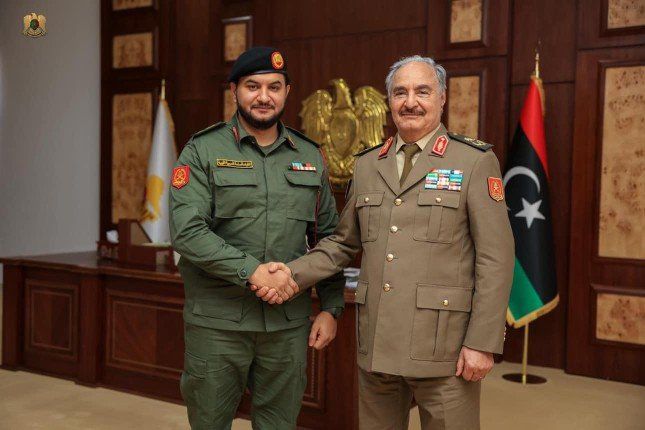Benghazi— The General Commander of the Libyan National Army (LNA) Field Marshal Khalifa Haftar has appointed his son, Saddam, as his deputy on the LNA’s 85th anniversary. Lieutenant General Saddam Haftar is currently holding the position of the Chief of Staff of the Ground Forces.
The LNA said the decision comes “in line with the Commander-in-Chief’s Vision 2030 to develop and enhance the overall performance of the armed forces.” This appointment will be followed by other similar steps in the coming days indicating a major reshuffle in the top brass of the Libyan armed forces.
The appointment as such did not come as a surprise to those who may had speculated about who would be a successor to Marshal Haftar. However, for the majority of Libyans, who have been witnessing the lack of stability and peace since 2011, a strong, resilient and unified national army seems to be always welcomed.
What is at stake for the general public is the preservation of the territorial integrity of the country, protect its borders and bring an end to the armed groups which have wreaked havoc in the western region for the last fifteen years.
The Speaker of the House of Representatives Aguila Saleh congratulated Lieutenant General Saddam Haftar for his appointment describing the as “wise, reflecting the firm confidence in his competence and military experience.”
Such appointment, said Mr. Aguila, “enhances the position of the military as an institution and bolsters its strength and ability to safeguard the nation’s sovereignty and protect its unity, security, and stability.”
On 14 August, the Egyptian Chief of Staff, Lieutenant General Ahmed Khalifa, congratulated Saddam Haftar on his appointment and his best wishes for Saddam’s success in his new duties, serving the interests of the Libyan people and preserving their security and stability,” according to the Egyptian Armed Forces spokesperson.
“The Egyptian military holds high the fraternal ties between the two countries’ armed forces, and it is committed to continuing joint coordination and cooperation in all fields to enhance the security and stability of the region and in confronting various sources of threat,” the statement said.
There has been no official reaction to the new military appointment in Benghazi from the Government of National Unity (GNU). At a graduation ceremony of new military cadets in Tripoli on 11 August, the head of the GNU Abdulhamid Dbeibeh said that the time of describing Libya as a “country of militias” is over.
The state “will extend its authority over all sovereign facilities, including ports, airports, and military bases, without any exception,” he added. The GNU is struggling to assert its authority on the widespread armed groups in northwestern Libyan region.
However, Abdullah al-Lafi, a member of the Presidential Council in Tripoli, called on the council in his capacity as Supreme Commander of the Libyan Army to hold an urgent meeting” to discuss the appointment of a Deputy to the General Commander of the LNA without referring to the Presidential Council.
Meanwhile, Osama Hamad, the head of the Parliament-recognized government, which firmly controls eastern and southern Libya, stressed that the appointment of Lieutenant General Saddam Haftar as deputy to the LNA’s General Commander “reflects his commitment to building a military force capable of confronting challenges and protecting the nation’s sovereignty and unity,” according to an official statement.
Hamad affirmed his continued support for the military institution, expressing his confidence “that this step, and those to come, will provide a strong impetus to the development and construction process within our armed forces, enhancing their readiness to meet the requirements of the current stage.”
Hamad affirmed his government’s continued support for the military institution, expressing his confidence “that this step, and those to come, will provide a strong impetus to the development and construction process of the armed forces.”
